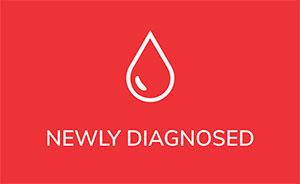In this video, Dr. Alexey Danilov, M.D., Ph.D., a chronic lymphocytic leukemia (CLL) specialist, now at the City of Hope Comprehensive Cancer Center in Duarte, California, is interviewed by CLL Society founder and Chief Medical Officer, Dr. Brian Koffman, M.D., a retired family physician and a CLL patient. This video was recorded at the 18th Bi-Annual Meeting of the International Workshop on CLL (iwCLL) in 2019, in Edinburgh, Scotland. At the time of this recording, Dr. Danilov was on the Knight Cancer Institute of the Oregon Health and Science University (OHSU) faculty in Portland, Oregon.
Dr. Danilov is well known for his research that focuses on early drug development in lymphoid malignancies to usher novel therapeutic approaches into the clinic. This research attempts to the immune response of both B-cell and T-cell lymphocytes in CLL.
B-cells, as compared to T cells, are far more likely to mutate into blood cancers such as CLL or other lymphomas.
As we know, chronic lymphocytic leukemia is a cancer of the B-lymphocytes that results from an over-proliferation and prolonged survival of B-cells resulting in their numbers excessively growing.
Immunity is a complicated subject, but it’s important to understand its role in both controlling cancer and infections. CLL is a cancer of the immune system. What follows is a simple explanation of what some of the important immune cells should do, and sometimes don’t when one has CLL.
Basically, to start our explantion, think of the immune system as consisting of two armies of cells: innate and acquired. Innate cells, macrophages, or other cells such as basophils, neutrophils, or dendritic cells are the first responders, a “non-specific” line of defense deployed to attack a wide variety of invading pathogens such as a bacteria, viruses, or parasites.
When a more sophisticated and sustained attack occurs, the body turns on its B-cells and T-cells for a more targeted response to the threat. These two cell type can also play a co-ordinated role in the development, suppression, and treatment of cancer. T-cells are the focal point of many emerging immunotherapy treatments such as immune checkpoint inhibitors (PD-1) and CAR-T therapy.
B-cells are the liquid or “humoral” part of the immune system. They fight bacteria and viruses by making antibodies, which are “Y” shaped proteins that lock onto a pathogen’s cell surface and “mark” it for destruction by other immune cells.
There are two main types of T-cells, the soldiers of the “cellular” immune system: helper T-cells (CD4) and cytotoxic or killer T-cells (CD8). The ratio and absolute counts of these two types of T-cells can be crtical to proper immune funtion. Killer T-cells directly kill cells that are infected by a foreign invader. T-cells also send chemical signals to the remainder of the immune system to ramp-up immune response.
Another typer of T-cells are regulatory T-cells or Tregs (CD4+, CD25+, and FOXP3+). They can release immune-suppressive cytokines (proteins) that stifle anti-tumor response. There are too many of these in CLL patients and that leads to immune suppression.
There is a degree of T-cell dysfunction or “exhaustion” in all CLL patients. Moreover, the cancer cells themselves can often evade patrolling T-cells by making themselves appear harmless.
Ibrutinib (Imbruvica®) has immunomodulatory effects by inhibiting Bruton’s tyrosine kinase (BTK) and IL-2–inducible T cell kinase (ITK). Ibrutinib improves the “skewed” T cell profile seen in CLL and that may partially explain why infection rates fall after one year on ibrutinib. These immune benefits may also be true with other BTK inhibitors such as acalabrutinib.
One focus of Dr. Danilov’s research areas is the NEDD8 – Activating Enzyme (NAE). Early research indicates that targeting this pathway may enhance T-cell function by prevent the overproduction of Tregs. This in turn may help restore nornal immunity in CLL and other lymphomas.
Conclusions:
Correction of the T-cell dysfunction associated with CLL is a tremendous unmet need. Infections and second cancers are CLL patients’ biggest threats. Dr. Danilov and his team are among the cadre of investigators doing research to better understand the causes of T-cell dysfunction in CLL and to discover potential pathways to overcome it. A well functioning immune system is crtical for our long term health.
Thanks for reading this summary and viewing this interview.
If you are interested in another article on immune function in CLL, you might enjoy Dr. Koffman’s ASH interview with Dr. Adrian Wiestner of the NIH here.
Stay strong; we are all in this together.
Brian Koffman MDCM (retired) MS Ed
Co-Founder, Executive VP and Chief Medical Officer CLL Society
Thomas. E. Henry III, MBA, RPh, CPh
Member CLL Society Medical Advisory Board and Blogger – https://www.cllpharmacist.com



